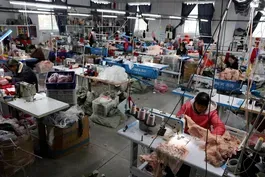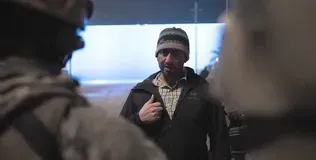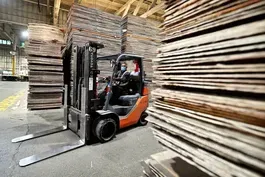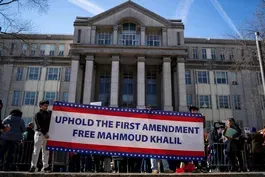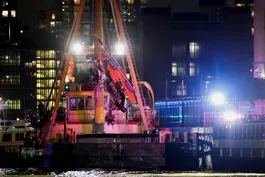
Brooks and Capehart on Trump’s tariffs and market reaction
Clip: 4/11/2025 | 11m 2sVideo has Closed Captions
Brooks and Capehart on Trump’s tariffs and reaction from the markets
New York Times columnist David Brooks and Washington Post associate editor Jonathan Capehart join Amna Nawaz to discuss the week in politics, including President Trump's tariffs and reaction from the markets, whether claims of insider trading should be investigated, Trump using executive power to go after critics and the legal battle over the administration's immigration policies.
Problems with Closed Captions? Closed Captioning Feedback
Problems with Closed Captions? Closed Captioning Feedback
Major corporate funding for the PBS News Hour is provided by BDO, BNSF, Consumer Cellular, American Cruise Lines, and Raymond James. Funding for the PBS NewsHour Weekend is provided by...

Brooks and Capehart on Trump’s tariffs and market reaction
Clip: 4/11/2025 | 11m 2sVideo has Closed Captions
New York Times columnist David Brooks and Washington Post associate editor Jonathan Capehart join Amna Nawaz to discuss the week in politics, including President Trump's tariffs and reaction from the markets, whether claims of insider trading should be investigated, Trump using executive power to go after critics and the legal battle over the administration's immigration policies.
Problems with Closed Captions? Closed Captioning Feedback
How to Watch PBS News Hour
PBS News Hour is available to stream on pbs.org and the free PBS App, available on iPhone, Apple TV, Android TV, Android smartphones, Amazon Fire TV, Amazon Fire Tablet, Roku, Samsung Smart TV, and Vizio.
Providing Support for PBS.org
Learn Moreabout PBS online sponsorshipAMNA NAWAZ: From tariffs that sent the markets reeling to legal immigrants having their status revoked, it's been quite a week.
We're going to turn now to the analysis of Brooks and Capehart.
That is New York Times columnist David Brooks and Jonathan Capehart, associate editor for The Washington Post.
Great to see you both.
AMNA NAWAZ: So, roller-coaster week for the markets, as you have both seen, driven almost entirely by this on-again/off-again tariffs policy.
Jonathan, the White House says this was all the art of the deal, that the countries are now lining up to negotiate separate country-by-country trade deals.
Do you see a strategy here, or do you see a president who saw markets plunging on his policies and blinked?
JONATHAN CAPEHART: No and yes.
No, there's no strategy here, none at all.
And, yes, he saw the markets tanking and blinked, but blinked I think primarily because of the bond markets.
And you had a segment earlier where you talked all about this, but I think people need to understand and appreciate that, while Donald Trump has been able to defy political gravity, this week, he learned that he cannot defy economic gravity.
And when the bond markets -- when folks who usually go to the bond market when the stock market is going bananas and they decide to sell off their bonds, that has enormous implications for the American economy, for bonds being the safe haven for the world.
That's not the case anymore.
And the idea that he single-handedly is going to, like, wrangle the world to his view on tariffs is, I don't know how else to describe it other than insane.
AMNA NAWAZ: David, what do you make of that?
DAVID BROOKS: Yes, I remember wasn't in the James Carville in the Clinton years who said, when he died, he wanted to be reincarnated as the bond markets, because they have all the power?
(LAUGHTER) DAVID BROOKS: So there's some truth to that.
I think there's been a shift.
And so there was some rationale.
It was stupid, but it was a rationale for the original tariff everybody.
And that was, we want to restore manufacturing to this country.
DAVID BROOKS: But when it becomes deal by deal, and it's all temporary, and it's all up for negotiation, no entrepreneur is going to invest in this country if this -- the tariff levels are going to move up and down.
There's just no way you're going to invest.
And so what is -- that regime was to try to restore manufacturing.
This regime is about corruption.
And so what is a tariff?
It's an amassing of political power over the economy.
And what do people do who are in the economy who want to keep their business alive?
They have to find a way to bribe the political leaders who run the tariffs.
And so the countries are going to come in, hiring local lobbyists here to lobby the Trump administration.
What do we have to give?
Who do we have to give to?
Companies are going to be asking for waivers.
Who do -- what we have to give?
How much do you want, Mr. Trump?
And so the fact that Trump's in the center of all these negotiations puts him in the center of a web of corruption.
And I think that's what we're going to see.
AMNA NAWAZ: How much of this do you think is about countering China, though?
Because, obviously, that trade war continues to escalate.
The White House would say, this has put China in a bad position.
That's good for the U.S. DAVID BROOKS: Yes, that's more defensible, frankly.
China really is dumping cheap electrical vehicles on the whole rest of the world.
And so I think, if we focused on China, and if we did it in a way that was predictable and that was ratcheting, rather than drastic up and down, you could defend that policy.
But the way Trump is doing it is, like, so massive that a lot of -- like, if you buy T-shirts, if you buy a dry cleaner -- I mean, a washing machine, all that stuff comes from China.
Bicycles come from China.
The fact is, the bottom line is, if they make cars cheaper and better than we do, they're going to be able to sell their cars.
And the core problem here is not China being exploitative, though they do that.
The core problem is, they're better at manufacturing than we are.
And so somehow we have to fix that problem, but tariffs are not the way.
AMNA NAWAZ: Jonathan, we heard this concern from Democrats and others this week about some of the messaging from the president, encouraging people as the markets were plunging to buy into the dip.
Last Friday, he posted online: "This is a great time to get rich."
On Wednesday he posted: "This is a great time to buy."
That was right before he paused those higher tariffs.
We know a lot of the other tariffs still stay in place.
What do you make of all that?
Should that be investigated?
JONATHAN CAPEHART: Yes, it should be investigated.
But I think that's a prime example of what David was just talking about, about the corruption that all of this seems to engender.
Of course this needs to be investigated.
Of course it needs to be, but it's not going to be, quite honestly.
Democrats are not in - - they're not in the majority.
And Republicans don't seem to be interested in looking at anything that the president does, but absolutely this should be looked into.
AMNA NAWAZ: And, David, we already saw warning signs.
Lisa reported on earlier consumer sentiment dropping.
Experts we talk to say American consumers are going to feel this really in -- starting in May or June.
How long do you think people will actually give the president, this administration to let this policy run?
DAVID BROOKS: I was really shocked by how much consumer confidence has dropped.
That was quite a plunge.
And I think it's a lot of people looking around, like I'm looking around and thinking, well, I can now afford to retire in 2097.
Like, I mean, people's -- the majority of Americans have money in the stock market through their 401(k)s or through whatever.
And it concretely makes a difference.
And I talk to people.
Like, I was talking to a electrician recently, Trump supporter, by the way, who it's wrecking his business, and so -- a bicycle manufacturer, wrecking his business.
People who have built their companies over the whole lifetimes, and suddenly they have no supply.
Their business no longer makes sense with these tariffs.
So this is not just some political game here.
This is actually touching people's actual lives.
AMNA NAWAZ: Meanwhile, Jonathan, we saw Laura reported last night on the latest executive order from the president targeting two former Homeland Security officials who worked in the first Trump administration.
That was Miles Taylor and Chris Krebs.
And also she reported on this larger pattern of him using his executive power, using the DOJ to go after perceived political enemies and institutions, even law firms in some cases, who we have now seen actually cutting deals with the president, right?
The president just said today that some -- a number of law firms have reached deals committing some $600 million in legal work for his administration.
What do you make when you look at this bigger picture and what's the impact of those kinds of deals?
JONATHAN CAPEHART: Well, first on Miles Taylor and Chris Krebs, let's not lose sight of the fact that, even though they are former Trump administration officials in the first term, they are now private citizens.
The president of the United States is now targeting private citizens for things that they have done that he thinks have wronged him.
When it comes to the law firms, what's so -- among the many things that's so troubling about all of this, the $600 million that you just mentioned, that's $600 million in pro bono work that those law firms would have used, could have used for all the other causes and people who can't afford legal representation to help them hold the government accountable in one way or another.
And instead what the Trump administration has done has been able to work up a $600 million legal slush fund, if you will, to have the administration go after in another way his enemies.
Remember, Donald Trump ran for another term in the White House saying, "I will be your retribution," and then on the campaign trail talking about going after his political enemies, seeking vengeance.
This is what we're seeing.
This is the result.
And it should trouble everyone.
AMNA NAWAZ: David?
DAVID BROOKS: I took a lot of -- benefited a lot from piece Jonathan Rauch wrote in "The Atlantic" a couple -- maybe a month ago a couple weeks ago, saying there are certain systems - - people say Donald Trump is quite verging on authoritarianism, but the real thing he's verging on is patrimonialism.
And patrimonialism -- authoritarianism is based on institutions and a set of laws and -- but patrimonialism is the attempt to turn the government into a family business.
And it's sort of a premodern form of government, if you go back before democracy, before the Treaty of Westphalia and all that kind of stuff.
It was -- it was run by families.
And the family enriched itself.
And they took after anybody who threatened the family.
It's a little like mafioso.
JONATHAN CAPEHART: I was going to say, it sounds like the mafia.
DAVID BROOKS: It's like, you're making an offer you can't refuse.
And so Trump is treating the justice system the way the head -- the father of this patrimonialistic system would treat it.
And he's going after things that are just personal.
And so that's the erosion of democracy, which is supposed to be about clear laws that apply to everybody.
And we no longer live in that system.
AMNA NAWAZ: Meanwhile, we know this week there was a lot of headlines, a lot of news on the legal front when it comes to immigration policy.
Laura reported earlier, of course, this is a president who came in saying that he was going to go after illegal immigration, and he has.
They have taken big steps to crack down on illegal immigration.
We're also increasingly seeing them go after people who have legal status, legal protected status, legal green card holders, legal visa holders.
Jonathan, when you look at that, what is the strategy here from this White House?
JONATHAN CAPEHART: The strategy is to go after anyone the president doesn't think belongs here.
When he ran for president, he did this sort of rhetorical magic act, where people heard he's going to go after violent criminals who are here, undocumented criminals.
But then in the next breath, he should say, we're going to go after -- quote, unquote -- "criminal aliens."
Well, if you come into this country without documentation, you, by the letter of the law, are a criminal.
And so that to me was a signal, he's not just going after violent criminals.
He's going after anyone who is not here -- quote, unquote --"legally."
But also it's easy to see, given who Trump is, that he would move beyond going after those who are not -- going after the undocumented and going after others with temporary protective status, TPS, green card holders, as we're seeing.
Sadly, none of what he is doing is shocking to me.
He's been telegraphing this.
What's shocking to me is that the courts in some instances don't seem to be meeting the threat here with much vigor.
The idea that the court would say, the Supreme Court would say you need to facilitate the return of Mr. Abrego Garcia, instead of saying, no, he must be returned, that to me is very troubling.
AMNA NAWAZ: This was the man who was mistakenly deported to El Salvador.
JONATHAN CAPEHART: To El Salvador, yes.
DAVID BROOKS: Yes.
AMNA NAWAZ: All right, David, last word here in the few seconds we have left.
DAVID BROOKS: Yes, I spoke to an immigration expert earlier in the administration who had served earlier in government.
And she said, they're -- you're going to see a lot of show business here, that they don't actually have the facilities to deport masses of people.
We just don't have the airplane seats, frankly.
But they can show their viciousness by doing big things that will play well on FOX.
And some of the deportations show they're vicious, they're tough, they're taking care of this problem.
But a lot of it is show business, but the crueler, the better.
AMNA NAWAZ: David Brooks, Jonathan Capehart, great to see you both.
Thank you so much.
China raises tariffs on U.S. imports in trade war escalation
Video has Closed Captions
Clip: 4/11/2025 | 2m 58s | China raises tariffs on U.S. imports in latest escalation of trade war (2m 58s)
Former Navy SEAL on 'Warfare' and its depiction of combat
Video has Closed Captions
Clip: 4/11/2025 | 6m 9s | Former Navy SEAL on making the new film 'Warfare' and its authentic depiction of combat (6m 9s)
How Trump's trade war is impacting U.S. and global economies
Video has Closed Captions
Clip: 4/11/2025 | 7m 2s | How Trump's tariffs and trade war are impacting U.S. and global economies (7m 2s)
Judge rules Trump administration can deport Khalil
Video has Closed Captions
Clip: 4/11/2025 | 11m 39s | Immigration judge rules Trump administration can deport Columbia protestor Mahmoud Khalil (11m 39s)
News Wrap: Tourist helicopter crashes in Hudson River
Video has Closed Captions
Clip: 4/11/2025 | 5m 24s | News Wrap: Investigators search for cause of tourist helicopter crash in New York (5m 24s)
Patriotism takes hold in Taiwan amid threat from China
Video has Closed Captions
Clip: 4/11/2025 | 6m 29s | Patriotism takes hold in Taiwan in face of growing threats from China (6m 29s)
Providing Support for PBS.org
Learn Moreabout PBS online sponsorshipSupport for PBS provided by:
Major corporate funding for the PBS News Hour is provided by BDO, BNSF, Consumer Cellular, American Cruise Lines, and Raymond James. Funding for the PBS NewsHour Weekend is provided by...
